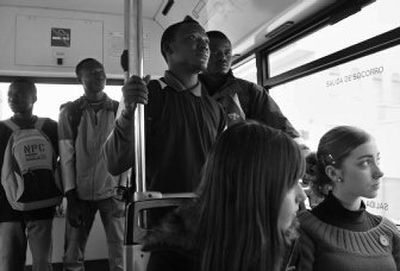Program in Spain helps former child warriors

ALMERIA, Spain – Edwin Tholley wasn’t yet 10 years old – he can’t remember exactly – when rebel bosses first injected cocaine into his face, a quick way to get it surging into his brain. They wanted him high – an unthinking, vicious little warrior for their campaign of terror in Sierra Leone.
Tholley’s face still bears scars from the needle-pricks. Now, however, under an innovative rehabilitation program in Spain, Tholley hopes to redeem himself and save lives by studying to be a nurse, and maybe someday a doctor.
“My ambition is to help others,” said Tholley, 20, one of four Sierra Leone natives brought here by Todos Son Inocentes (They Are All Innocent), a Spanish aid agency that works with children in war zones.
“All of us are responsible,” Tholley said. “We have to make this effort.”
The United Nations says at least 250,000 children are used as fighters in about a dozen conflicts in Africa, Asia and South America.
Once their missions are over, they bear scars far deeper than needle marks.
Job training is offered combatants in Sierra Leone and Liberia, another West African country which also used child soldiers. The problem, experts say, is that jobs are scarce for such rehabilitated men.
The Spanish program is different because the training is in advanced skills – two of Tholley’s colleagues will study agronomy – giving the men expertise that fills shortfalls in destitute countries like Sierra Leone.
“It’s a big opportunity for me to study agriculture here in Spain. I’m sure after my course I will try the best I can to help the people of my country,” said another of the students, Victor Young, 23, who smiles big but then, like the others, avoids talking about his days as a child soldier.
“Let the past be the past,” Young said, staring at the ground. “It’s a difficult process to regain peace again.”
“War is the worst. We’ve recovered, and all we want is to think about the future,” added Gabriel Kamara, 20, who is also studying to become a nurse.
Before these men set foot in Spain, their only contact with the country came from ammunition and weapons etched with the words “Made in Spain.”
The group arrived in early March in Almeria, a southern port city. The rehab program takes four years and is being sponsored jointly by the Todos Son Inocentes, the University of Almeria and the regional government.
In less than a month the men have become celebrities, invited to media interviews on their experiences, concerts and soccer matches. Their home is a youth hostel close to the beach.
“For them being in Spain is like a fairy tale,” said Miguel Serrano, head of Todos Son Inocentes, who selected them in Sierra Leone and brought them to Spain after overcoming many hurdles with the country’s often-corrupt bureaucracy.
Those who sign up for the program must commit to returning home after completing their studies.